
Scientists from the University of Sheffield found that more than half of older people in South Yorkshire don’t consume enough protein to stay healthy
The research is published in Geriatrics and was conducted by Dr. Bernard Corfe et al.
In the study, the team assessed the diets of 256 older people aged between 65 and 89 years old.
They found less than 50 percent of participants met current UK recommendations of consuming 0.75 grams of protein per kilogram of their body weight per day (around 53 grams for a man and 46 grams for a woman).
However, many experts believe that older adults need higher protein intake than the UK recommendations, with international organizations suggesting 1.2 grams of protein per kilogram of body weight per day.
Less than 15 percent of the study group met this age-specific recommendation.
It has also been shown that older adults need to consume 25-30 grams of protein at each of their three daily meals to stimulate muscle protein synthesis.
Only one participant in the study was achieving this, with other participants eating lower levels of protein-rich foods in the morning in particular.
The team says protein consumption, especially when combined with exercise, helps to slow down the loss of muscle mass and strength that comes with aging.
Inadequate protein intake contributes to muscle wastage, impacting physical function and increasing the risk of frailty and mortality through falls.
This risk is again increased in older adults with obesity, who may be unable to exercise or move freely, as their weight may mask the problem.
The team also found that meat, fish, and dairy contributed to 86 percent of protein intake for the participants.
They suggest that the participants could benefit from increasing their daily protein, especially in the morning when consumption was low.
As an indicator, you can get 32 grams of protein from a chicken breast and 6 grams from an egg.
Older adults can easily bolster their protein intake by eating high-protein breakfast cereal, or an egg and slice of brown toast for breakfast.
People should also think about including sustainable and plant-based sources of protein in their diets such as beans, lentils, tofu and peas.
If you care about nutrition, please read studies about the best foods for brain health, and this food supplement may help relieve anxiety.
For more information about nutrition, please see recent studies about nutrient that could strongly lower high blood pressure, and results showing this novel antioxidant may help reverse blood vessels aging by 20 years.
Copyright © 2022 Knowridge Science Report. All rights reserved.



